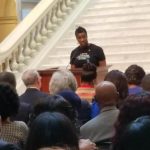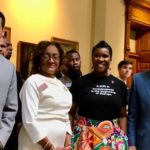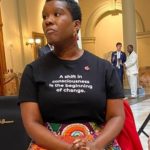In honour of Martin Luther King Jr. Day, Nadia Theodore, Canada’s Consul General in Atlanta gave keynote remarks at the State of Georgia’s holiday tribute in the Capitol. In a statement released before the event, she said “As a Black woman appointed to be Canada’s senior diplomat in the U.S. Southeast, based in Atlanta, I aspire to the example of leadership, integrity and fortitude set by Dr. King, and embrace his commitment to the pursuit of equity and human rights, not for any one marginalized group, but for all people.”
Read her full remarks below on how Dr. King and his legacy influenced Canadians and our own march toward greater inclusivity and a just society.
Honoured guests, dear friends, ladies and gentlemen. I would like to express my deep appreciation to the Dr. Martin Luther King Jr. Advisory Council and Senator Jones for inviting me to participate in this tremendous event.
For having always been so warm and welcoming to me personally, and for their continued friendship with Canada, I would also like to acknowledge Governor and First Lady Kemp; Lieutenant Governor Duncan; the Legislative Black Caucus; and Reverend Bernice King.
Thank you Representative McLeod for that generous introduction. It is gratifying to continually encounter Canadians like you – and like our anthem singer Ruby Velle – who are making unique contributions to the political, cultural and commercial undertakings of the United States.
It is an honour for me to be here today. I was born in Ottawa, Ontario, to parents who immigrated to Canada in early adulthood from St. Lucia – a small island in the Caribbean. My dad grew up in the south end of the island, a family of 5 – in a 1-room house. He was able to go to St. Lucia’s best high school (in the north of the country), because of a tuition scholarship he earned, coupled with the generosity of a family who agreed to take him in to their home during the school year and cover his non-tuition costs.
That combination of hard work and the kindness of strangers continued, as he earned a scholarship to go to Michigan State here in the United States for his first degree, and then to Canada, where he completed a master’s degree, put down roots and built his life. And that family in St. Lucia that took my father in, had a daughter, who later become my father’s wife, his life-long partner, and my mom.
I tell you this not only to provide you with a sense of the origin story that allows me to stand in front of you all, as my country’s head of a diplomatic mission to our most significant international partner, but to underscore how one small action, one act of kindness, one action of beloved community, can reverberate not just across days, weeks and years – but across generations.
For me, that is the most compelling take-away of Canada’s connection to the U.S. civil rights movement and Dr. King. The actions between African Americans and Canada during the movement has defined our countries’ relationship, and reverberated across generations.
I am here addressing you today because of a serendipitous conversation I had last year with Senator Jones about the Underground Railroad. We discussed how Canada symbolized hope for enslaved African Americans in a period when freedom seemed unattainable. Allow me to share Dr. King’s own words on what he called the singular historical relationship between American Negroes and Canadians.
Deep in our history of struggle for freedom Canada was the North Star. The negro slave, denied education, de-humanized, imprisoned on cruel plantations, knew that far to the north a land existed where a fugitive slave if he survived the horrors of the journey could find freedom. The legendary underground railroad started in the south and ended in Canada. The freedom road links us together….Heaven was the word for Canada and the Negro sang of the hope that his escape on the underground railroad would carry him there.
By this time, slavery was illegal in Canada and there were no laws in place protecting slave owners or slave catchers, so it was the safest place for a fugitive slave. The province of Ontario had the largest population of free slaves, a number estimated at around 17,000. Many of them entered this area of Canada through either Ohio or New York, having made the arduous journey from the south.
This intertwining of our people and of our past is a critical part of Canada’s story, of the history of success for Black people in Canada. Indeed, decades after African Americans sought refuge in Canada, some leading Black Canadians have sought opportunities here in the United States after being denied a chance at home.
Abraham Beverly Walker, a journalist and civil rights activist, and the first Canadian-born black lawyer, dispirited by the systematic and institutional racism he encountered in Eastern Canada, moved his family to Atlanta for a period hoping to find a place among this city’s growing Black middle class. Last year in Canada, he was awarded the Order of New Brunswick, 110 years after his death.
Then, there’s entrepreneur Viola Desmond who studied in New York at Madame CJ Walker’s school, because the white-run Canadian hairdressing institutions were not welcoming to Black students. Desmond is known as Canada’s Rosa Parks for being arrested after refusing to leave a white’s only area of a Nova Scotia movie theatre – nine years before Rosa Parks sat her ground. In 2010, the Canadian Government apologized and provided a pardon to now-deceased Viola Desmond. And today, she is the face of Canada’s ten-dollar bill.
So, in Canada’s journey towards truly living up to the principles that define us as a country around the world – diversity as a strength, and inclusion as an embraced choice – we have, at many times, been inspired by our neighbours.
The high regard that Canada has for Dr. King is not only in his post-assassination legacy. We were very much engaged with his philosophy during his lifetime.
In 1967, Canada’s centennial year, Dr. King was asked to deliver the Canadian Broadcasting Corporation’s Massey Lectures. The program, which continues today, is an annual series of speeches about a political, cultural or philosophical topic given by a noted scholar. They were created in 1961 to honour Vincent Massey, a Governor General of Canada, for his work promoting culture and the humanities.
During the heat and the turmoil of 1967 in America – that summer would see major riots in Detroit and Newark – Dr. King was the ideal choice for the influential lecture series. A young Canadian radio producer named Janet Somerville oversaw his participation and worked directly with Dr. King to ensure that his lecture was honest about the significance of the outbreak of riots across the United States, and the importance of citizens not just in the U.S., but in Canada and around the world, to be unapologetic and relentless in working toward racial and economic equality.
As Janet recounts , while Dr. King was passionate about seeing necessary change in his country, he was also a patriot. Speaking critically about America while addressing another country seemed ill-advised. Imagine this: a 28-year-old white Canadian woman, a Catholic, a neophyte producer – giving notes to the decade-older, accomplished, African American reverend, philosopher and activist?
But she did. The message was too important not to. And the impact of the message went far beyond the borders of the United States of America. What do I mean by this?
Well, for example: in 1961, following a trip to Toronto where he spoke on another CBC show, Dr. King wanted to vacation with his family at Fundy National Park in the Eastern Canada province of New Brunswick. Dr. King’s friend and intended host wrote to the innkeeper of the property where they wished to stay. The letter read, “Canada’s history being what it is, we feel confident that you would treat them well, but we want to make sure.… The friends of whom I speak are a fine Negro minister and his wife.”
The response received from the innkeeper stated, “A great many [guests] are from the New England States, as well as those from farther South. For this reason we feel it would be better not to accommodate your friends.”
And in Canada’s 1967, a system of residential schools – government-sponsored institutions that were established to assimilate Indigenous children into Euro-Canadian society, and which saw over 6,000 Indigenous children die in the system, was just ending. However, that abhorrent practice then gave way to what was called the “Sixties scoop,” during which thousands of Aboriginal children were “apprehended” by social services and removed from their families.
The message on the importance of racial and economic equality was bigger than the United States. Dr. King understood this. He took the advice from young Janet.
He doubled down and worked with the CBC team to deliver recordings that conveyed his urgent convictions about racism and poverty. Dr. King spoke of his emerging vision of the American rights movement as part of an international freedom struggle against the economic exploitation of the poor and disenfranchised.
The broadcast of the five lectures, packaged as “Conscience for Change,” began in November 1967 and ended on Christmas Eve. Available today in books and on YouTube, they are considered by some King scholars to be among the best summary of his mature thought.
As a diplomat, I am particularly energized by one of the lectures’ key messages: that people have to transcend the boundaries of race, tribe, class and nation. “We must either learn to live together as brothers, or we’re all going to perish together as fools,” Dr. King said. How true that remains today.
It seems like the world has become ever more divisive. I attribute that to a reluctance to speak to and listen to people who hold different points of view. The world of diplomacy, of negotiation, is all about doing just that; it is about listening to the different sides of an issue and trying to develop solutions that will allow all parties to walk away feeling like they have gained something.
The work that diplomats around the world are doing is truly helping to contribute to the sustainability of the rules-based international order, which is fundamental to building and maintaining peace and prosperity around the globe.
Evidently, Dr. King was satisfied with how the Massey Lectures turned out. Early in 1968, he called Janet Somerville directly and asked her to return to Atlanta to work with him as a speechwriter. She declined, as she was at the time, the primary caregiver for her ill mother. A few months later the civil rights giant was assassinated.
Their collaboration had a tremendous impact on Janet. The experience clarified that her mission was in the church rather than in broadcasting. She became a prominent speaker and writer, focused on faith and social justice. She was the first woman and first Catholic to hold the position of General Secretary of the Canadian Council of Churches.
And in 2003, she received my country’s highest honour, the Order of Canada, for her lifetime advocacy for interfaith understanding, human rights and peace. When I heard this story – another example of how our countries’ people and past are intertwined – it resonated with me.
As a child and teenager, I was in awe of Dr. King’s faith and resilience, especially around the strategy of nonviolent action. Today, as one of the few women of colour, and the only Black woman, to represent my country abroad as head of a diplomatic mission, I aspire to his example of leadership, integrity and fortitude. I embrace his commitment to the pursuit of equity and human rights, not for any one marginalized group but for all people.
As a leader and a manager, I admire his ability, at the height of his power and influence, to find value in the vision of a subordinate. I hope that I too possess the courage, humility and trust required to accept criticism for the greater good. Leadership requires the courage to speak and the humility to listen.
Today, voices of xenophobia and exclusion are vying to influence the policy agenda on a host of complex global challenges. At the same time, persistent issues of poverty, conflict and human rights violations remain deeply rooted in discrimination and other forms of exclusion. In the face of these contemporary realities, we must work together and be deliberate about promoting and advancing equitable policies and inclusive attitudes that truly support diversity.
We have a lot to learn from each other, and if we are intentional about harvesting those experiences, the impact will be significant. As the quote on my t-shirt – from a Canadian theologist, philosopher and award winning filmmaker, Jennifer Baichwal – reads: a shift in consciousness is the beginning of change. And that begins at the micro level – an adult respecting the wishes of a child; a Muslim and Christian finding common ground; a great man learning from a young woman still finding her way; an American listening to a Canadian – as you have all done today.
Thank you. I invite you all to join me for a reception in the South Wing at 2:45. We will have some tasty Canadian goodies and a pre-recorded video of Janet Somerville reflecting on her experience with Dr. King. Merci.


